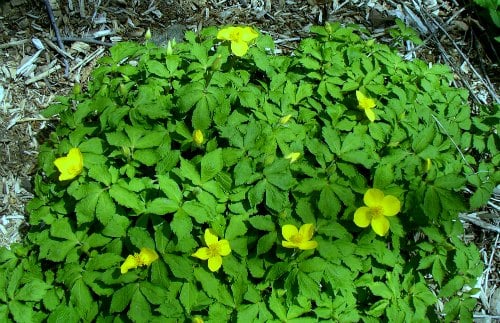
Hylomecon japonica is a special, collectors plant for the shady garden. It is rarely offered for sale, and seed from most seed exchanges will provide the wrong seed. This is a plant that is certainly worth hunting down.

The plant forms quite large tubers that start to grow in early spring. In zone 5, the flowers appear early May and continue for about 2 weeks. When flowering is finished the plant has made a nice tight clump of leaves that persist until early summer. At that time the leaves die back, and the plant rests underground until next spring.
Common names for Hylomecon japonica include; forest poppy, Japanese woodland poppy, and Japanese poppy. These common names, and the yellow flowers have led to confusion in the industry. This plant is routinely confused with the other woodland poppies; Stylophorum diphyllum, Stylophorum lasiocarpum and Chelidonium majus.All four plants have similar looking leaves, and similar yellow flowers.
A detailed analysis of each of these species can be found at http://www.gardenmyths.com/hylomecon-japonica-which-is-the-real-plant/

S. lasiocarpum has leaves that are distinctly different and can easily be distinguished from the other 3. C. majus is a biennial and the flowers are half the size of the others. Hylomecon japonica and Stylophorum diphyllum can be easily distinguished by their seed pods. H. japonica seed pods are very thin and point straight up in the air. The seed pods of S. diphyllum hang down, and are plump fruits almost as wide as they are long. Once you understand that the 4 plants are similar, they are fairly easy to tell apart.
Hylomecon vernalis may be a different species, but some authorities consider it to be a synonym of H. japonica.
Hylomecon japonica
(hy-LOH-mee-kon juh-PON-ih-kuh)
Life Cycle: perennial
Height: 30 cm (1 ft)
Bloom Time: spring
Natural Range: Japan, Korea, China and Russia
Habitat: forest understories, ditch sides, shaded habitats to 2400m
Synonyms: Chelidonium japonicum, Stylophorum japonicum,
Cultivation of Hylomecon japonica :
Light: part shade to shade
Soil: well drained to moist
Water: regular moisture in spring, dry after flowering
USDA Hardiness Zone: 5 – 9
Propagation: seed, division
The following video showcases all of the favorite plants for 2015:

If you can’t see the above video, then use this link instead: https://youtu.be/GbLlQgn0vLs



First-reader and new subscriber. Would you have a source for Hylomecon japonicum? Can I expect it to do well under shade in the heat and humidity of the Southeastern US (Zone 7b)? Thanks for any and all information.
I don’t know of any US sources. Seed may be obtained from NARGS – North American Rock Garden Society in some years. My plant produced almost no viable seeds last year. I’ll be looking for some again this year.
I think it will be OK in zone 7 – but I have no experience in such tropical climates 🙂 I’m in zone 5.
Thanks for your prompt and helpful reply. We have an active chapter of NARGS here, so I will ask. Good luck with all your projects.
I have been trying to find a source for Hylomecon in Canada and the closest I can find is Lost Horizons in Acton Ontario. They no longer ship -pickup only. Unfortunately I live on Prince Edward Island ! Any other sources you know ? Send me some seeds ?? 🙂
Not that I know of. I would send seeds, but my plant does not make seed. Most of the seed available from gardens in seed exchanges is not viable seed. I suspect that it needs to be cross pollinated and all my plants are one clone.